Review by Joe Gordon
By Owen D. Pomery, published by Avery Hill
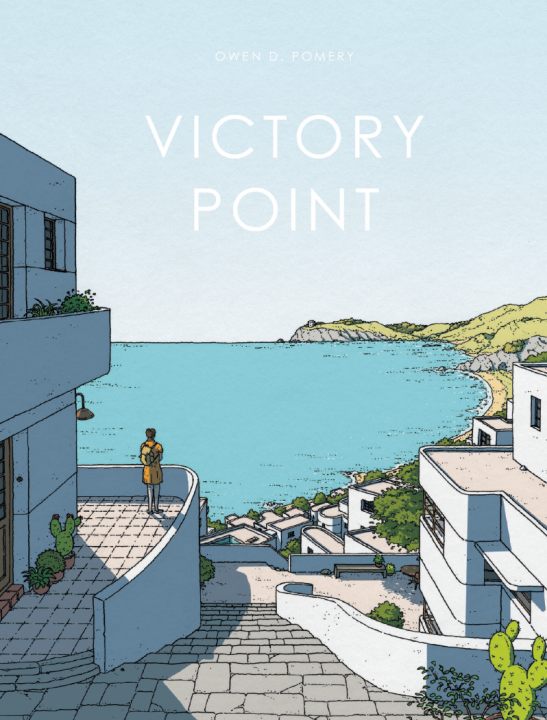
During the seemingly endless, long, slow days of the main part of Lockdown, Avery Hill released a trailer for Owen D Pomery‘s upcoming Victory Point, and sent me a link to view it, along with a few preview pages. It’s fair to say I was smitten right away, and it brightened a Lockdown day; I’ve been waiting since then to get a proper read at the full graphic novel.
I was not disappointed. I’ve long had what I refer to as my “bookseller’s Spidey-sense” (caused by a paper cut from a mildly radioactive book) that gives me a vibe on certain new books, before I have even read them, and I know I am going to like them a lot. I don’t know how that vibe works, but it’s never steered me to a bad read yet, and I got it in spades looking a the previews and trailer for Victory Point.
Owen’s educational and professional background is in architecture and illustration, and that shows very much in Victory Point. A small coastal village, it is unusual – not to mention extremely pretty – for having been designed entirely by one architect as part of a socio-architectural experiment in the inter-war years, to create a small town that would not only be a home to families but be a base for artistic and scientific colonies (perhaps inspired by some of the artist colonies that for many years drew creators to places like St. Ives, in Cornwall). In true British tradition, this vision was never fully realised, with only part of the town constructed, and it soon turned into a regular, quiet little seaside town, save for the unusual architecture that visually unites the area.
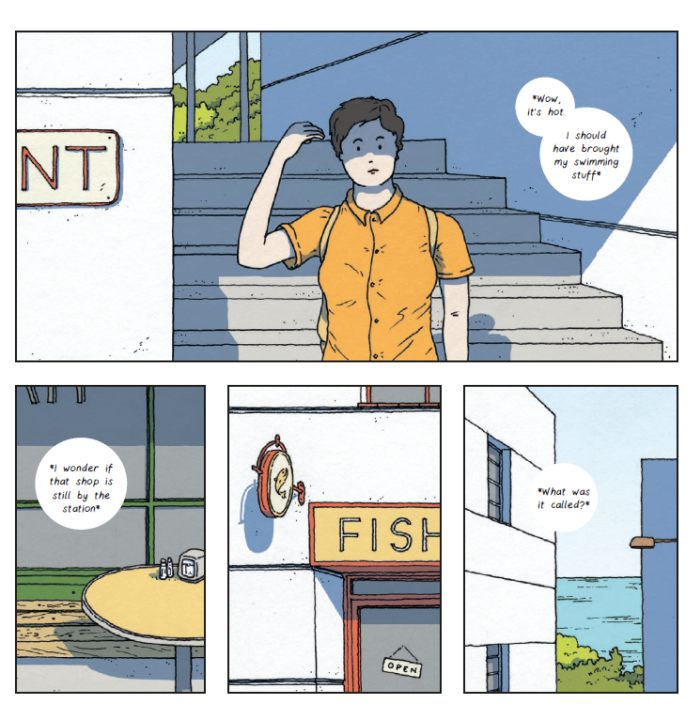
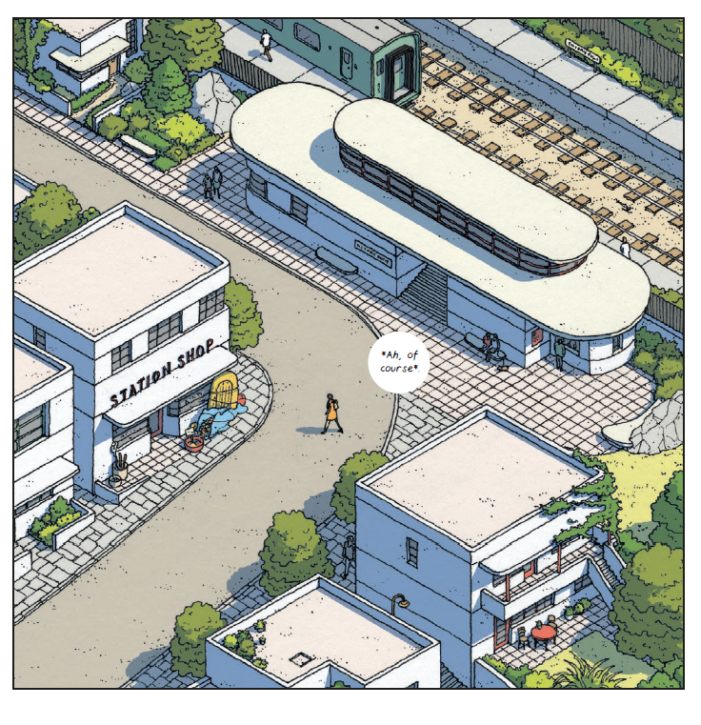
And what a style it is, all beautiful, clean lines of 30s Modernist architecture, elegant without being fussy, the buildings and streets carefully situated into the descending slope of the coastal landscape as it reaches down from cliffs above to the beaches and sea below, all drawn in Owen’s handsome, clear-line style. We first see Victory Point on a bright, summer’s day, as Ellen, a bookseller in the (unnamed) big city is returning by train; this is her home-town, and she is coming back to visit her dad.
The fact that it is a summer’s day makes it ideal for luxuriating in the views of these gorgeous Modernist buildings that festoon the slopes of the hills, the elegant curves, the whitewashed walls catching the light beautifully. I’ve always loved the architecture of this period, and there is something particularly nice about this style when on the coast. I still have childhood holiday memories of Morecambe in the summer, and the beautiful Midland Hotel (fortunately now refurbished and restored), with its Modernist and Art Deco grace right by the sea, catching the light and making me think of the great ocean liners from the golden age of travel – long before I was old enough to understand what those art and architectural styles were, I knew they were beautiful.
The pace of the story is leisurely, and this allows Owen to indulge himself and the reader in the luxury of just wallowing in a pool of beautiful illustrations, as the returning Ellen walks through her old home-town to her parent’s house, and we are treated to so many simply wonderful, beautiful panels, with many of the panels being large, or even entire pages, the better to drink in the art. The pictures also do a magnificent job of conveying something of that glorious light quality of a clear, summer day by the coast, especially on that handsome, whitewashed architecture.
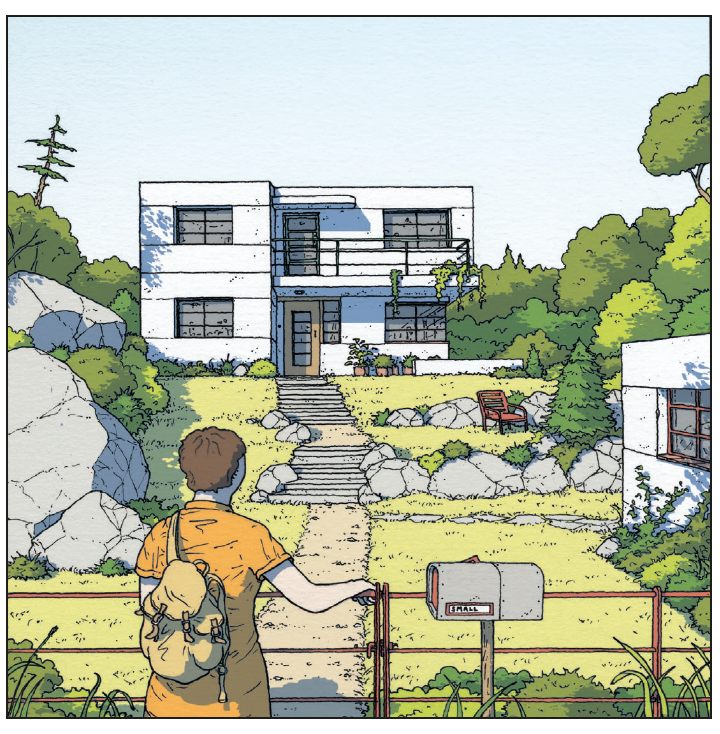
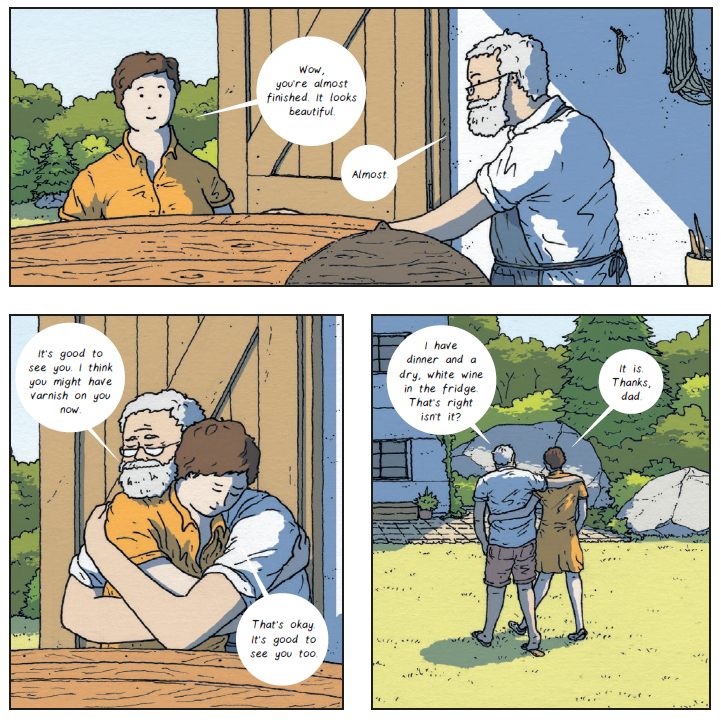
Not that this is a book just about a beautiful architectural experiment turned delightful anomaly – students come out from the city to behold “what might have been” if the experiment had been completed and expanded to others. But they see only the myth of the genius of the designer, not the fact that it is a real place, with real people living real lives (I must confess, despite vastly different architecture – though just as striking – I experience the same often in Edinburgh where I live, where it feels many visitors see it almost as a set and forget it is a living, working place and home). No, there is a story here, about belonging, about home and leaving, about growing up, about being part of your family but also needing to be yourself, and that bittersweet mixture of hope and joy and regret and sadness that entails.
Victory Point perfectly captures that slightly surreal feeling of coming home when it isn’t really your home anymore, something most of us will have experienced. Going back to the home town, to the parental mansion, still home and yet, not really home, because now we are grown up and moved away somewhere else that is now home. But this is still somehow home too, but we feel a weird mix of being a visitor as well as belonging now. Likewise, Ellen’s reunion with her dad expresses those feelings many of us will have had on going back home to a beloved parent, of realising they are getting older, that while you are all now adults and living your own lives, they are still forever interlinked, and that no matter how old you are, that feeling that in your parent’s heart of hearts, you are still their little child and they worry about you, want to help you, see you be happy, are planning, even now, to try and make sure you will be okay when they are no longer there (and how our minds rebel against the thought when they bring such plans up).
The artwork for the characters is reminiscent of the Hergé style – no bad thing, of course – with the little dots for eyes and simple yet effectively expressive faces that still convey so much emotion despite their economy (a single panel of her dad hugging her when she arrives home is just beautifully done and radiates emotion), and characters, architecture and landscape are all integrated so well in Victory Point, not just from the visual, aesthetic point of view, but also in terms of the story and the competing emotions underlying it.
It felt to me that this elegant, beautiful, quirky failed socio-architectural experiment was in many ways a metaphor not only for Ellen’s life, but for any of our lives, how something can seem, from the outside, to look perfect, enviable even, be it another’s home or their life, compared to our own, but of course beneath those facades are the same complex problems everyone has. The use of matching architecture to make an almost uniform town, except real towns don’t exist that way, they’re a mixture of styles and periods, a melange, much like the lives of those who live in them. Or Ellen visiting the secretive little cove where she first learned to swim as a child, floating naked in the clear water, the perspective from above, showing the geology of the coastal hills meeting the sea, Ellen, wondering where her life will go next, floating, suspended between the sea and sky and land.
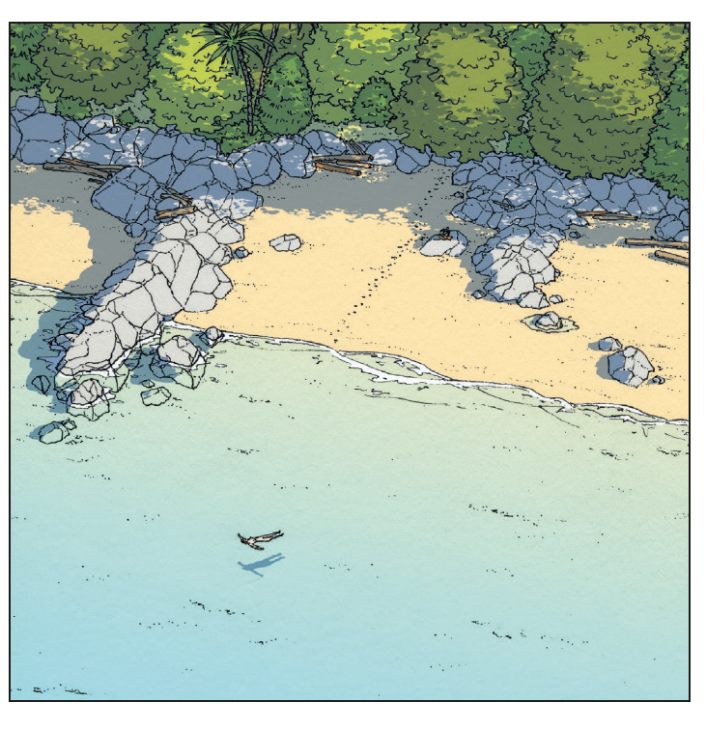
Yes, Victory Point is a visually stunning, beautiful piece of comics work, filled with elegant artwork and vistas designed to show those structures off, but it is also a quiet, gentle tale of life and growing up and our competing goals and emotional attachments to people and places that all go to make us who we are and form what we do, all the hopes and desire, all the fears and regrets. This is a book I will come back to again and again to just drink in.
Joe Gordon
• You can also order Victory Point direct from Avery Hill Publishing here
• Owen D. Pomery is on online at owenpomery.com | Twitter | Instagram
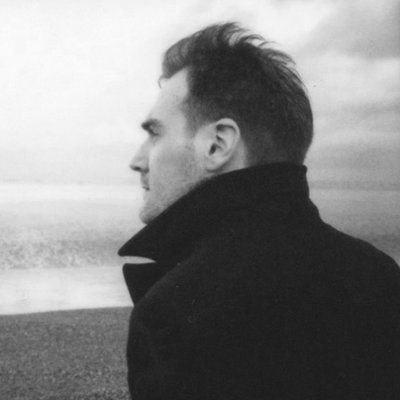
Owen has a professional and educational background in architecture and has spent the past nine years specialising in illustration, with his particular area of interest being architectural narrative.
He is the author/illustrator of several graphic novels, including British Ice, published by Top Shelf and Victory Point. He lives in South London, and is normally found drawing or exploring.
Joe has been a bookseller since the early 1990s, with a special love for comics, graphic novels and science fiction. He has written for The Alien Online, created & edited the Forbidden Planet Blog and chaired numerous events for the Edinburgh International Book Festival. He’s more or less house-trained.
Categories: British Comics - Books, downthetubes Comics News, downthetubes News, Features, Reviews
 New book, “Harmsworth’s Comic Paper Rivals” reveals early British comic competitors
New book, “Harmsworth’s Comic Paper Rivals” reveals early British comic competitors  In Review: The Modesty Blaise Artists (Illustrators Special)
In Review: The Modesty Blaise Artists (Illustrators Special)  In Review: The A to Z of British Newspaper Strips by Paul Hudson
In Review: The A to Z of British Newspaper Strips by Paul Hudson  In Review: The Unofficial History of The Beano by Iain McLaughlin
In Review: The Unofficial History of The Beano by Iain McLaughlin